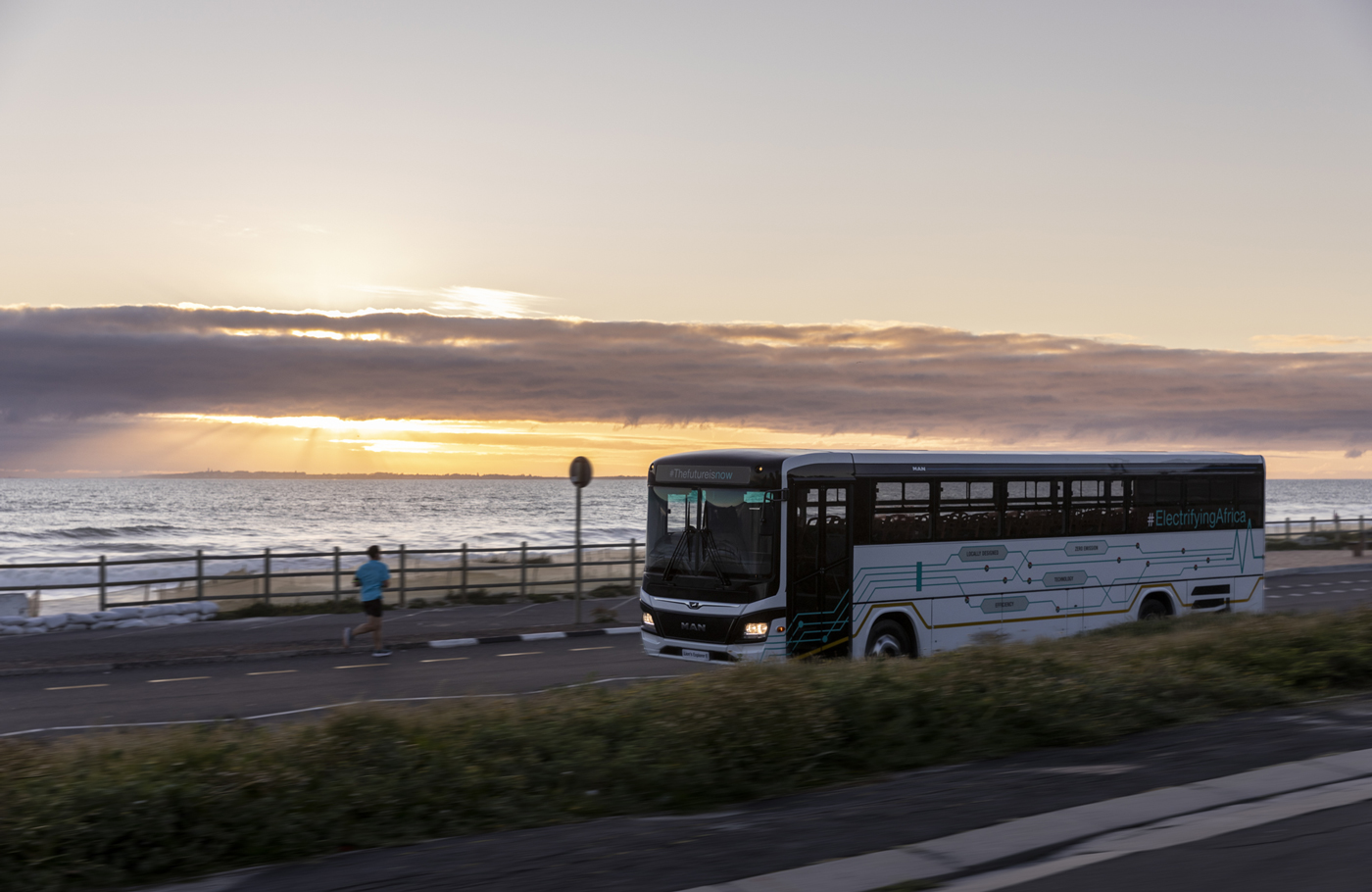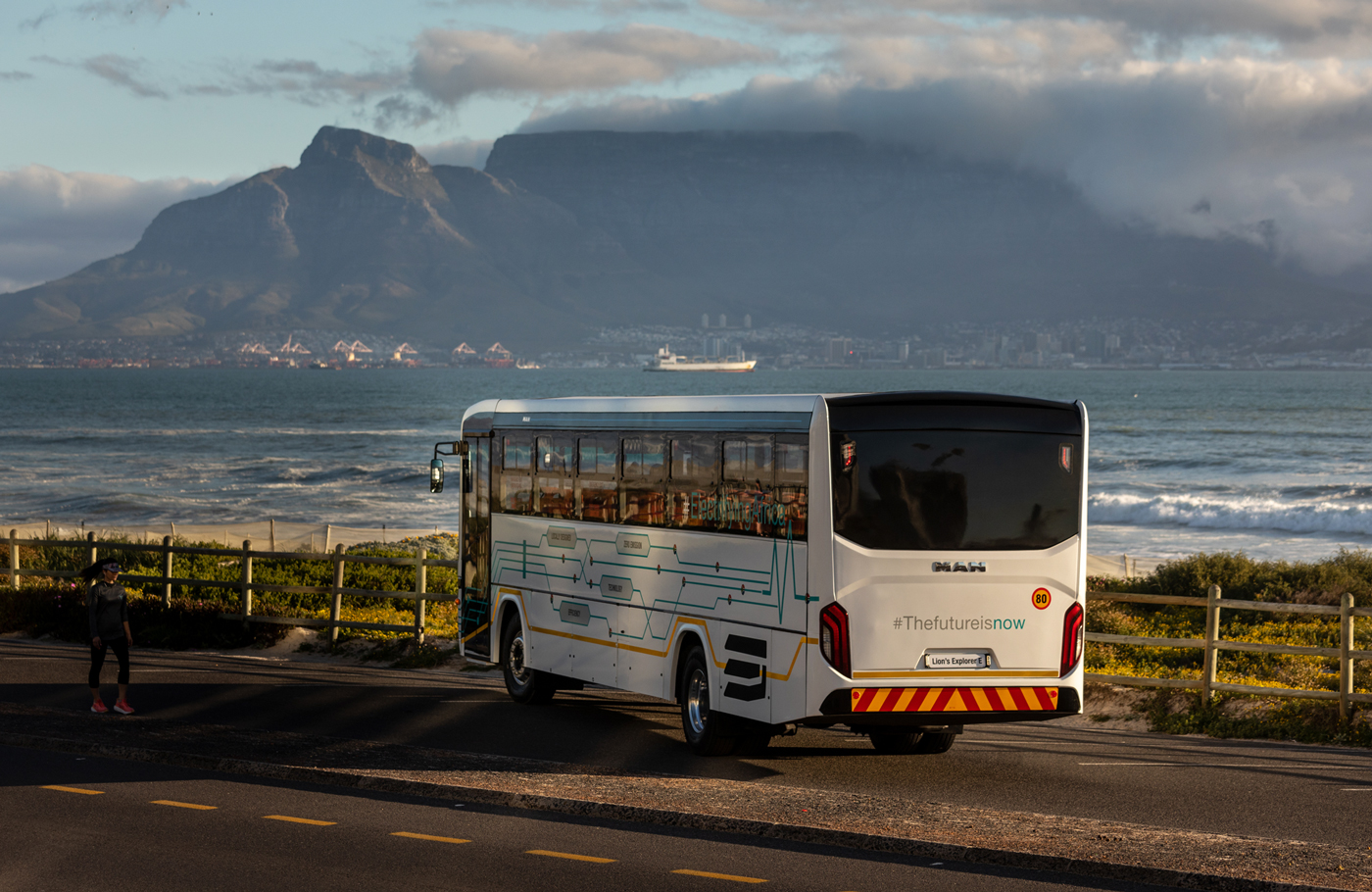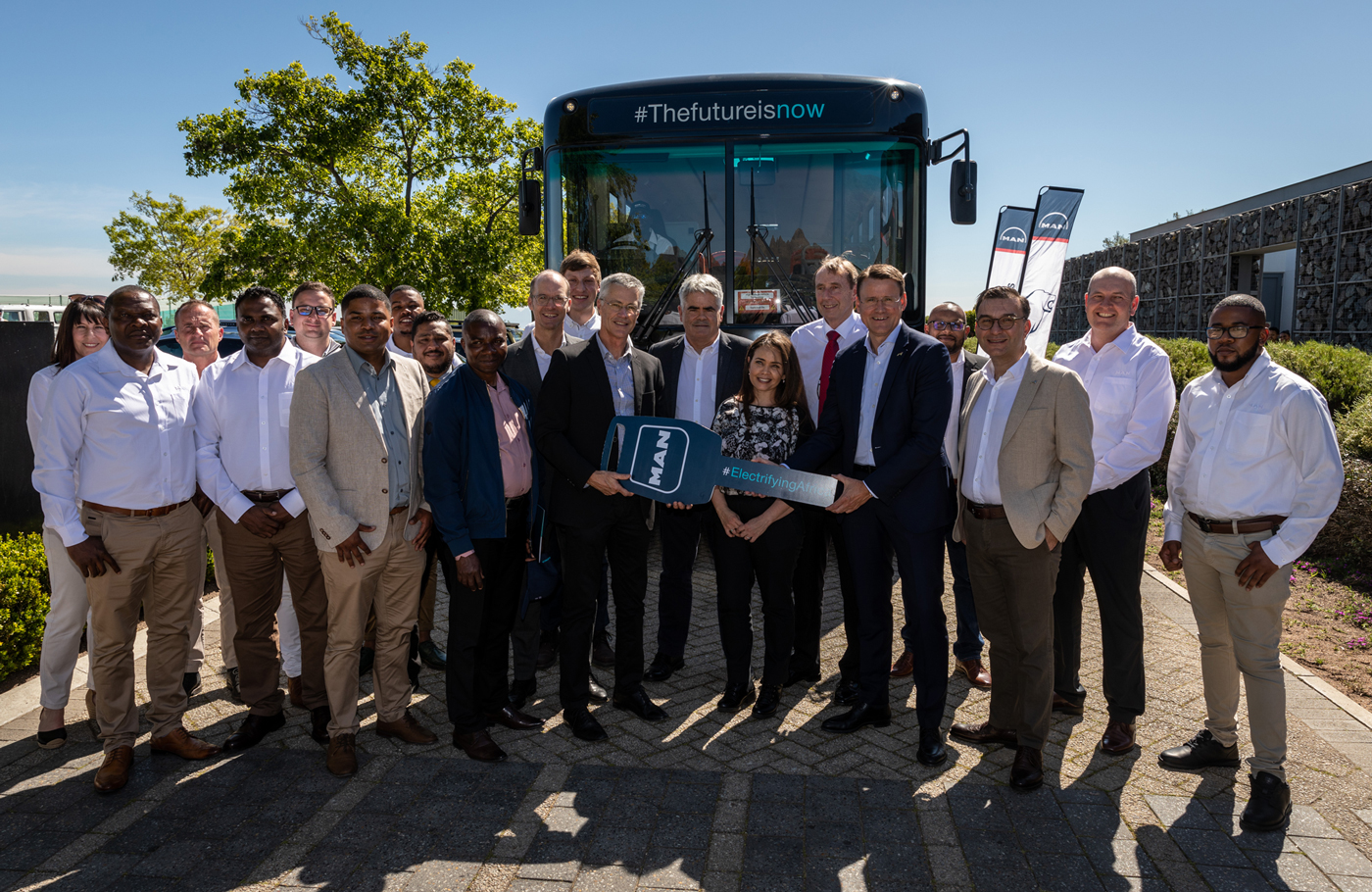MAN makes eBus history
MAN makes eBus history
History has been made! The first MAN Lion’s Explorer 12 E has been delivered outside Europe. Its destination? None other than South Africa. CHARLEEN CLARKE joined the celebrations as the vehicle was delivered to Golden Arrow Bus Services (GABS) in Cape Town.
An electric bus? But South Africa has insufficient electricity, and there are no government subsidies in place. Electric buses just aren’t viable in this country!
That’s what the critics of electric buses in this country are saying. And guess what? They’re completely and utterly wrong. As we learnt at the handover of the MAN Lion’s Explorer 12 E to GABS in Cape Town, loadshedding doesn’t present any problems (in terms of charging buses, that is). And those pesky government e-mobility subsidies that have been rolled out all over the world, but not in South Africa? Well, those aren’t a problem either.
These two startling revelations at the handover were joined by the news that this is the country’s first eBus specifically designed, engineered, and built for local purposes, rather than simply being imported from overseas.
Uniquely South African
“The MAN Lion’s Explorer is the only OE-manufactured bus body in South Africa, and it is uniquely designed for African conditions to exacting European standards. The same can be said of the Lion’s Explorer 12 E,” explains Jan Aichinger, managing director of MAN Automotive South Africa.
The Lion’s Explorer 12 E vehicle delivered in South Africa is based on the new Lion’s Chassis E, which is scheduled to go into series production next year (2024). What is special in this case is that, unlike in Europe – where MAN produces and sells complete buses – the company mainly offers chassis on the global market, which are then assembled into complete buses in-country by certified body manufacturers. In the case of the Lion’s Explorer 12 E, however, MAN not only supplied the chassis, but also built the body according to the customer’s wishes and market requirements.
This was realised at the MAN Bus plant in Olifantsfontein, South Africa. The upstream assembly of the electric high-floor chassis was carried out in conjunction with the second local MAN site in Pinetown, which is particularly sustainable thanks to its climate-neutral production. “We combined the best of two worlds. In this way, we have succeeded in delivering the first electric city commuter bus to be developed and built in South Africa, while at the same time meeting the requirements of our customer on the road to a zero-emission future,” says Aichinger.
The eBus has four battery packs based on proven lithium-nickel-manganese-cobalt (NMC) battery technology with 80kWh each, giving it a total installed capacity of 320kWh. An integrated electric motor generates peak power of up to 240kW – sufficient for use on the roads of Cape Town. The bus has a range of up to 350km.



Weight-optimised design
Most battery electric vehicles (BEVs) suffer from excess dead weight, but the MAN Lion’s Explorer 12 E is weight optimised and achieves a slightly better seated passenger capacity versus its equivalent MAN internal combustion engine product derivative (the eBus can seat 66 people; the 12.5-m MAN Lion’s Explorer can seat 65). This was made possible through smart engineering and careful selection of modern lightweight engineering materials, including wooden flooring harmonised with aluminium trims in strategic areas of the bus.
Signalling the importance of the handover, Alexander Vlaskamp and Barbaros Oktay – CEO and head of bus respectively at MAN Truck & Bus – both attended the handover of the vehicle. Unsurprisingly, both are extremely upbeat about the event. “It’s a special experience for each of us when we hand over a new vehicle or technology to a customer for the very first time… even more so when we make a significant contribution to more environmentally friendly mobility,” says Vlaskamp.
He believes that partnerships with like-minded companies like GABS are key to moving forward and making a difference. “For MAN, too, CO2-free driving is a core element of its strategy, and the handover of the MAN Lion’s Explorer E is a milestone along the way. Our path leads from low emission to no emission,” emphasises Vlaskamp. “To achieve this, we are relying entirely on electric mobility in the city bus segment with the Lion’s City E in Europe – and worldwide we are doing the same with the Lion’s Chassis E, because our responsibility for sustainable mobility does not end at Europe’s borders.”
Proudly South African
Oktay says the South African team played a significant role in developing the eBus. “The chassis was re-engineered by our South African engineers. In this way, we can ensure that the eBus perfectly meets the needs of the local transport companies and, at the same time, can also be integrated into existing processes in the best possible way. If this succeeds, electromobility will gain significant momentum in South Africa – we are convinced of this,” he stresses.
MAN Truck & Bus is the market leader in the bus business in South Africa, with a market share of just over 45% of bus sales (as at the end of 2022). The goal is to maintain this position in the future with electric drives. “This requires vehicles that have innovative technologies, convincing ranges, and solutions that are tailored to the market and well thought out – like the Lion’s Explorer E,” says Oktay, adding, “We are doing everything we can to ensure that the new eBus is as well received in South Africa as our Lion’s City E is in Europe, with over 1,000 units already produced.”
GABS will now test the bus in Cape Town. Data collected in the next year will be shared, analysed, and utilised by MAN’s engineering team to further enhance its BEV products.
Ditching diesel
GABS’s goal is to gradually convert its fleet of diesel buses to electric vehicles, and Francois Meyer, the transport company’s CEO, says this is vital. “This situation (climate change) did not just come out of the blue. It is the result of a number of events and Planet Earth is not happy! The business world is being quite slow in reacting to this,” he contends.
GABS thinks differently and is known for its progressive (and logical) thinking. “BEVs make sense, not only for the planet but also for our bottom line. More than 31% of our cost comes from fuel,” notes Meyer. A long-time MAN customer (GABS has purchased over 1,000 buses from MAN over the years), the company is a huge fan of the MAN Lion’s Explorer. “Our relationship with MAN has spanned more than 24 years and we reckon the MAN Lion’s Explorer is the best commuter bus in South Africa,” he reveals.
The forward- and fast-thinking management team at GABS soon realised, however, that BEVs were the way of the future. “So, we started discussions with MAN about getting BEVs 18 months ago. We reached this point neither by luck nor chance,” Meyer says. “The data confirms that there is no other way forward for us. The more research we do, the more our e-mobility case grows.” As an aside, this is not the company’s first foray into EVs. GABS – which is 162 years old – actually operated electric trams in Cape Town 130 years ago!
Meyer isn’t fazed about recharging or funding the eBuses; the buses aren’t used 24/7, so they can easily be charged, and he says the financial model is sound. “We have ample charging time. There’s absolutely no progress in terms of government subsidies – but we can make this work without them,” he asserts.
Launching in 2024
GABS wants to purchase at least 60 BEVs every year. With this in mind, Aichinger says the company has a clear product roadmap, which includes a rollout of completely knocked-down (CKD) production of the electric bus chassis and a full product market launch in 2024.
Significantly, the eBuses will be built in a “green” fashion. “Our local factories – the chassis/truck assembly plant in Pinetown and the bus and coach plant in Olifantsfontein – are both operated from a clean and renewable source of energy. This directly supports our strategic move towards environmentally benign and emission-free products,” Aichinger reiterates.
The first handover outside Europe to GABS is just the beginning, with further “demo buses” based on the Lion’s Chassis E to be delivered to markets outside Europe over the next couple of months. Series production at MAN’s Polish plant in Starachowice is scheduled to start in 2024.
Published by
Charleen Clarke
focusmagsa




